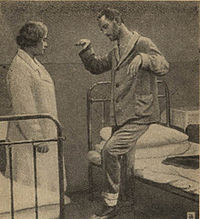
Photo from wikipedia
Catatonia is a psychomotor syndrome common to several medical and neuropsychiatric disorders. Here, we report on the case of a 95-year-old woman who underwent a radical change in personality characterized… Click to show full abstract
Catatonia is a psychomotor syndrome common to several medical and neuropsychiatric disorders. Here, we report on the case of a 95-year-old woman who underwent a radical change in personality characterized by sexual disinhibition, and physical and verbal aggressiveness. Over several months, she developed verbal stereotypies, gait deterioration, and double incontinence. She eventually developed mutism and an active opposition to all attempts to be fed or cared for. Benzodiazepines, olanzapine and electroconvulsive therapy were of no benefit. Magnetic resonance imaging revealed asymmetric (more severe on the right) frontotemporal, parietal, and upper brainstem atrophy. She died from sepsis without recovering from stupor seven years after the onset of symptoms. We believe that the initial behavioral disinhibition was related to the frontotemporal injury, whereas catatonic stupor reflected the progression of the degenerative process to the parietal cortices. Our case adds to the small number of cases of catatonia as a symptom of degenerative dementia. It also supports the idea that damage to the parietal cortex gives rise to pathological avoidance of which catatonic stupor represents an extreme form.
Journal Title: Frontiers in Neurology
Year Published: 2021
Link to full text (if available)
Share on Social Media: Sign Up to like & get
recommendations!